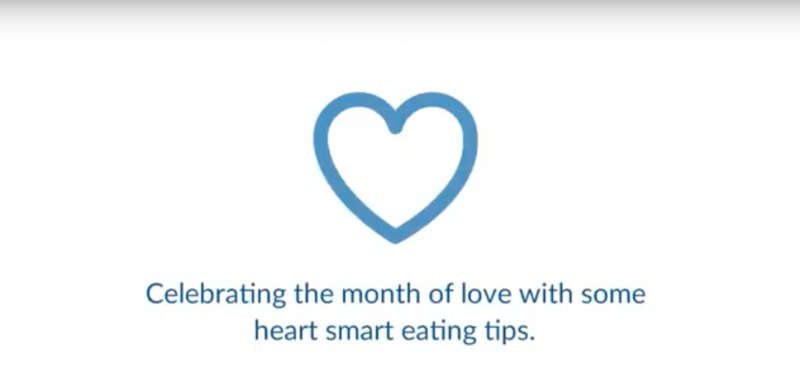Heart Smart Eating Tips

The month of February, or the month of love, seems like a prime opportunity to talk about heart health. There are several lifestyle factors that play a key role in maintaining a healthy heart. You can show your heart some love by choosing adequate amounts of physical activity, avoiding or limiting the use of tobacco and alcohol; and of course, practicing healthy eating. Let’s focus on some key heart smart tips.
Watch Your Sodium Intake
Our bodies need a small amount of sodium to be healthy, but excessive sodium intake can increase the risk of high blood pressure, which in turn, increases the chance of heart disease. The recommended intake level for adults:
- 14-50 years old is 1500mg per day
- 51-70 years old is 1300mg per day
- over 71 years is only 1200mg per day
Shockingly, studies show that most Canadians consume almost double this amount with an average daily intake of 3400mg. You can limit sodium by watching the amount you add to your meals; however, it is more often processed foods that are laden with salt. Be mindful of the choices you are making as processed foods do not even need to taste salty to contain large amounts of sodium. For example, 1 slice of bread can have upwards of 400mg of sodium per slice. This is nearly one third of your total daily need! Similarly, breakfast cereals, which often taste sweet not salty, can have several hundred milligrams of sodium. Bran Flakes, a popular cereal choice, has about 300mg of sodium per 1 cup serving. Label reading is your number one defense in avoiding high salt foods and making lower sodium choices.
Eat More Fiber
Fiber has many benefits when it comes to heart health. Intake of high fiber foods like whole grains, fruits and vegetables can keep you feeling full for longer. This helps maintain a healthy body weight, which is another important factor in keeping your heart healthy. Foods that are high in soluble fiber (such as oats, legumes and beans) help lower LDL cholesterol, this is the artery clogging type of cholesterol. Fruits and vegetables are not only high in fiber, but also high in vitamins, minerals and antioxidants. Antioxidants in particular can help protect your heart from free radical damage.
Understand Fats
Not all fats are created equal. Trans fats, and saturated fats are the real enemies when it comes to heart health. These fats are typically found in processed foods, fast foods, and high animal fat products; these fats can increase your risk of heart disease and stroke. Unsaturated fats, such as monounsaturated and polyunsaturated, as well as omega-3 fatty acids have health benefits when consumed in moderation and are found in foods like nuts, seeds, avocados, olive oil and fatty fish (salmon, trout, herring, mackerel, sardines).
Next Steps
In summary, it’s always best to choose one or two nutrition goals instead of completely overhauling your lifestyle overnight. An idea might be to read food labels, or limit take-out dinners to one time per week. Small changes can add up over time, and are shown to be a more sustainable way of improving your wellbeing. Focus on the heart this month and consider a few changes you could make to love this very important organ a little more.